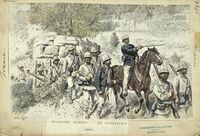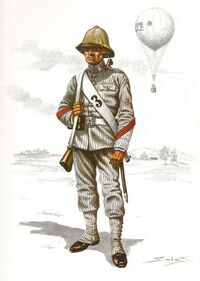Counter-Equatorial Movement
The Counter-Equatorial Movement, or Counterequatorialism, is a series of loosely related and in some cases unrelated yet convergent ideologies, state policies, and conspiracy theories decrying or set up in opposition to Latin nations. Depending on the specific group, this may include Romance countries or the Occident in its entirety, to varying degrees of what is considered Occidental by the group in question.
The term 'Counter-Equatorial Movement' was coined by Daxian merchant Xuo Luhoi in 1793. It was shortened to Counterequatorialism in Kiravian-Fanerian writer Pekōrva Illanova's writings in the mid-1800s as part of an essay on the Holy Levantine Empire and the subjugation of the Fiannrian people by 'Latins and Half-men'. While named for the general region of the Latin and Romance world straddling the equator, Counter-Equatorial movements exist in a number of equatorial or near-equatorial nations and colonies, namely in the Orient.
Social Movements
Quaternal Republicanism and Restarkism
Cronan Liberation Thought
Burgophobia
Anti-imperialism in Alshar and Audonia
La Garrote Conspiracy Theory
Great Eastern Resistance League
Kiravian social-nationalism and Kirosocialism
Pan-Green Camp in New Ardmore=
Anti-imperialism in Crona=
Global Burgieman Conspiracy Theory
Caphirian Covenant Conspiracy Theory
Military Conflicts
In many cases, colonial and trade wars have included elements of Counterequatorial sentiment. These have been most notable in Daxian campaigns against Occidental forces and the colonial wars conducted by Burgundie and its mercenary forces in Audonia. Counterequatorialism also fell into use as a term among native Cronan nations during the Deluge.
Great Rebellion of Slavery Bay
The Great Rebellion of Slavery Bay started in Kandoora colony in 1795 and parciptated a huge anti-imperial war across the Alshari and Audonian holdings of the Burgoignesc Colonial Empire. It started and ended in different times I'm different colonial holdings but saw the rise of national, self-determination, and anti-Occidental/"Equitorial" movements in the region. The Great Rebellion of Slavery Bay is considered the inflection point and the baseline for the relationships of nations of Alshar and Audonia and Equitorial persuasions. Having such a contentious foundation has led to conflict on a number occasions and serves as a polarizing point in internal relations between nations in Audonia and Alshar. For example, Bulkh and Zaclaria are considered puppets of Burgundie and Caphiria respectively and are held at arms length from pan-AlsharI concepts and organizations.
Emirati War
Main article: Emirati War


Between Burgundie, the United Pukhgundian Emirates, the Trucial States, and the Emirate of Kagazi. 1871-1897.
1880s Observation balloons, the first recorded use of a lighter than air vehicle to drop a device for a military purpose. Dropped a fused grenade.
Great Wars
During the First and Second Great Wars many nations in Alshar and Audonia fought against Equitorial nations, through their colonial remnants.
Operation Kipling
Operation Kipling is seen as another watershed moment in the counter-Equitorial movement when the Equitorial powers of Burgundie and Urcea engaged in anti-communist bush wars, civil wars, and counter-insurgency operations all over Alshar and Audonia for almost 20 yrs, with mixed results.
For the strongest advocates of counter-Equitorialism, even staunch anti-communists, the failure of Burgundie and it's ally Urcea to win every single one of it's chosen conflicts is lauded as a win for the counter-Equitorial movement.
However, because it involved Daxia on the side of the Equitorials it is celebrated in Burgundie and Urcea as a critical moment in diversification of their globalist vision and in that way the failures of Operation Kipling are explained away as necessary stumbling blocks to create a world more to their vision.